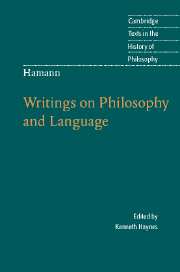Book contents
- Frontmatter
- Contents
- Introduction
- Chronology
- Further reading
- Note on the text, translation, and annotation
- WRITINGS ON PHILOSOPHY AND LANGUAGE
- Two dedications, from Socratic Memorabilia (1759)
- Essay on an Academic Question (1760)
- Miscellaneous Notes on Word Order in the French Language (1760)
- Cloverleaf of Hellenistic Letters (1762)
- Aesthetica in Nuce (1762)
- The Last Will and Testament of the Knight of the Rose–Cross (1772)
- Philological Ideas and Doubts (written in 1772)
- To the Solomon of Prussia (written in 1772)
- New Apology of the Letter h (1773)
- Golgotha and Sheblimini! (1784)
- Metacritique on the Purism of Reason (written in 1784)
- From Disrobing and Transfiguration: A Flying Letter to Nobody, the Well Known (1786)
- Index of biblical passages
- Index of names
- CAMBRIDGE TEXTS IN THE HISTORY OF PHILOSOPHY
Metacritique on the Purism of Reason (written in 1784)
Published online by Cambridge University Press: 05 June 2012
- Frontmatter
- Contents
- Introduction
- Chronology
- Further reading
- Note on the text, translation, and annotation
- WRITINGS ON PHILOSOPHY AND LANGUAGE
- Two dedications, from Socratic Memorabilia (1759)
- Essay on an Academic Question (1760)
- Miscellaneous Notes on Word Order in the French Language (1760)
- Cloverleaf of Hellenistic Letters (1762)
- Aesthetica in Nuce (1762)
- The Last Will and Testament of the Knight of the Rose–Cross (1772)
- Philological Ideas and Doubts (written in 1772)
- To the Solomon of Prussia (written in 1772)
- New Apology of the Letter h (1773)
- Golgotha and Sheblimini! (1784)
- Metacritique on the Purism of Reason (written in 1784)
- From Disrobing and Transfiguration: A Flying Letter to Nobody, the Well Known (1786)
- Index of biblical passages
- Index of names
- CAMBRIDGE TEXTS IN THE HISTORY OF PHILOSOPHY
Summary
Sunt lacrimae rerum – o quantum est in rebus inane!
A great philosopher has asserted that “all general ideas are nothing but particular ones, annexed to a certain term, which gives them a more extensive signification, and makes them recall upon occasion other individuals.” Hume declares this assertion of the Eleatic, mystic and enthusiast Bishop of Cloyne to be one of the greatest and most valuable discoveries that has been made of late in the republic of letters.
First of all, the recent skepticism seems to me to owe infinitely more to the older idealism than this single and fortuitous occasion would have us superficially understand, and that without Berkeley, Hume would hardly have become the great philosopher that the Critique, with a similar indebtedness, declares him to be. But as for the important discovery itself: it lies open and uncovered, without any special profundity, in the very use of language of the most common perception and observation of the sensus communis.
Among the hidden mysteries the problem of which (let alone the solution) has apparently not yet entered into a philosopher's heart is the possibility of the human knowledge of objects of experience without and before any experience and after this the possibility of a sensible intuition before any sensation of an object. The matter and form of a Transcendental Doctrine of Elements and Method is grounded on this double im-possibility and on the mighty distinction of analytic and synthetic judgments.
- Type
- Chapter
- Information
- Hamann: Writings on Philosophy and Language , pp. 205 - 218Publisher: Cambridge University PressPrint publication year: 2007
- 2
- Cited by

